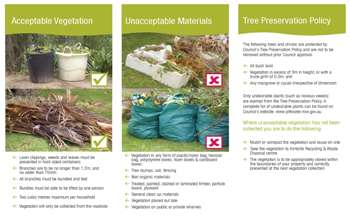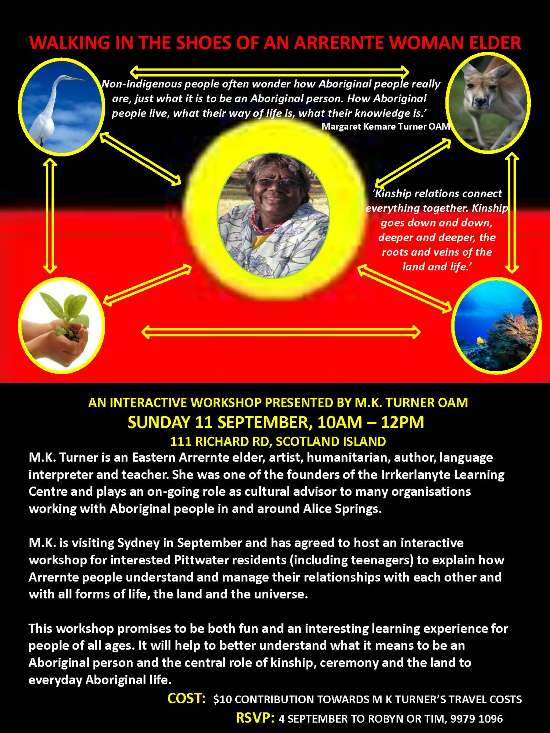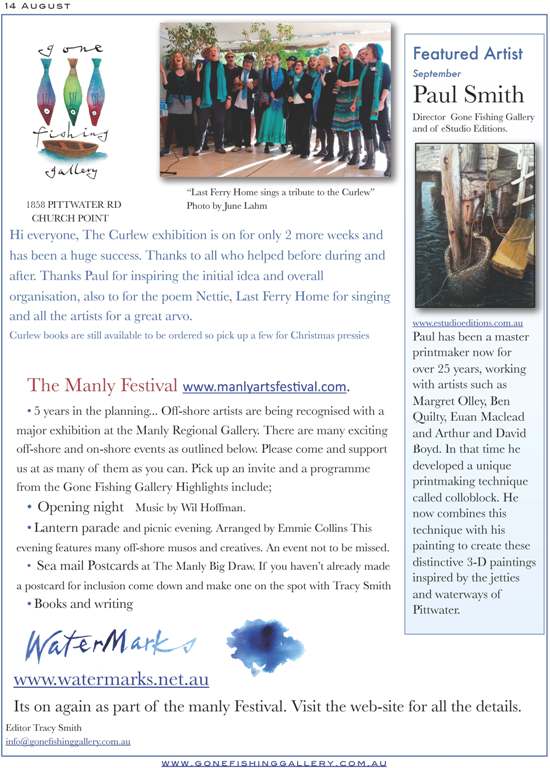| Having trouble reading this newsletter? Visit https://ymlp.com/archive_gesgjgm.php |
 |
| August 19, 2011 |
|
Notices
for
Offshore Residents
of Pittwater, Australia
|
|
Island Vegetation Collection MONDAY, AUGUST 22  Please put your material out as described below, and further in attached brochure and the Pittwater Offshore Directory BY SUNDAY, AUGUST 21
click the image to load the flyer
Animal Matters One of the lovely things about living on Scotland Island is the fact there are few fences to separate neighbours, something which has for us encouraged wonderful friendships to develop between families. The downside is that large dogs are roaming the island and are able to wander into anyone’s backyard. To come home on Friday and find the roof of our animal hutch knocked off, a mummy and her three baby guinea pigs dead and our beloved adult male guinea pig and rabbit missing was a very distressing find for myself and my three kids. There were large dog paw prints all over the cage roof, unfortunately no-one was home to see which dog was responsible. Luckily my daughter’s rabbit was found hiding under our neighbour’s house. The adult male guinea pig is still missing. Our thanks go to Robyn, Tim, Janelle, Amanda and Tyler and Noah for bravely crawling in under the house in the 2hr rabbit recovery. If you have animals in portable cages please make sure they are secure. If you have dogs and they roam the island please consider my kids who have lost five pets in what was from the evidence a violent attack. Lisa, Jessica, Tyler and Harley Yesterday, a large dog invaded and killed all of my grand children's guinea pigs (2 adults and 3 babies). They were in a specially constructed house which the dog/dogs got into and my daughter came home to find them all dead on the lawn. My granddaughter's rabbit was not among the bodies and after hours of searching we found and retrieved her from under the neighbour's house, luckily. I have written before about people letting their dogs walk freely and chasing our chicken when they are occasionally let out, but this is a case of dogs just wandering around and causing mayhem. We have the footprints and may call in the dog squad! Please contain your dogs. The second much nicer matter is that we have a Buff-banded Rail that often visits our garden - especially when we are working in it. It is always alone and we suspect it lives nearby as it comes when it hears us at work. Robyn Iredale Letter to the Editor About Kooka's and Whiteants Ref: Rebuttal of a Vet's View PON 12-18-2011 Thank you Brad, for coming out of the woodwork and giving us all a lesson in ecology, albeit from a more botanical perspective.. But really , Kookaburras dying out because they can't eat White ants?? .... Like they don't eat anything else?? Sorry Brad, but it's really NOT that simple, and suggests you know no realistic examples on the Island to support your case. Even the echidna has other preferences among the ant varieties available and is not an obligatory feeder of termites. Gathering firewood at worst will limit the white ants and contain their spread. You can also do this (and much more) by burning their nests and everything else around it, but then, apart from the obvious cruelty, you also wipe out an entire ecosystem which has no hope of recovery before the next hazard reduction burn sets the areas biodiversity back another 100.000 years. Remembering, Brad, that's how long it took to evolve?? I hope Brad's analogy doesn't represent his real knowledge of ecology after 17 years of experience as a "Bushi" & just indicates his willingness to further his cause by distorting the facts; speaking of which, the following may interest you since he questioned my qualifications on ecology. Ecology is a branch of science. To fully understand ecology you must first have scientific qualifications not the least of which is a science degree which the people whose articles Brad refers to, possess. Veterinarians have these basic science qualifications as they are a stepping stone to specialising in animal health, not just domesticated animals but also wildlife. We are the people scientists and researchers turn to for our knowledge when things aren't going right (Ulcers in Tassie Devils, Chlamydia in Koalas, Parasites in snakes, fungal rot in 'possums etc). Disease prevention is as important as their treatment. As a kid raised in the bush my fascination for all that creeps and crawls and a desire to make them better when sick is what led me to where I am now. Debunking an article by discrediting its author is a tactic employed to stifle debate and is all too often successful, people fear to comment lest they get shot down in flames. So I will refrain from personal commentary unless it's to defend personally disparaging remarks. Brad, 17 yrs of experience are no substitute for an education. This is not to say experience isn't valuable, it is, but without the proper background qualifications a psuedoscientist will need a lot more guidance. ..."Man's gotta know his limitations". Biodiversity is the key to ecology, and implies flora AND fauna, down to the smallest microorganisms breaking down organic matter and supplying larger organisms eg trees, with the necessary nutrients that they require for growth .Small mobile creatures contribute by spreading seeds, fertilising the area with droppings which are in turn broken down further by a whole host of critters from the dung beetle on thus accelerating the process of recycling nutrients. The greater the biodiversity the more sustainable an ecosystem is. The older and more stable the ecosystem (undisturbed) the greater the population it can sustain. To say that back burning is somehow beneficial to the maintenance of an ecosystem displays an appalling lack of understanding of what makes the whole thing tick. Lightning strikes causing bushfires are a rare natural cataclysmic event (when did this last happen on the island ) and rate among tsunamies and volcanic eruptions as nature's most devastating. Like wounds resulting in scars.There are a very few native plant species that are tolerant of, let alone benefit from fire and you don't need to lay waste to an entire habitat to accommodate these, leave that to lightning. Our Island's ecology managed to evolve for many thousands of years without the need for human "help" - relying solely on natural events however infrequent. Consider also that lightning is usually associated with rain providing a natural "brake". Of course the traditional custodians also burnt areas of forest ( and collected firewood ), but they did not do this to preserve biodiversity as much as to consume what emerged. Add to this the fact that this is an isolated island community with no hope of being repopulated by flightless creatures from large neighbouring intact areas as is the case on the mainland., and we can surmise that what is killed is permanently lost to this area. The remnant population is/has become too sparse to breed successfully, and the remaining ground cover too thin to adequately ensure the survival of their young ( If you can see right down to the mulch layer you've no adequate groundcover) This not only applies to back burning but also to overzealous clearing of bushland to the point where only a few spindly native plant species remain, with no ground cover to encourage protection and moisture retention essential for biodiversity. This in turn denies also native species essential nutrients. It takes too long for the previous balance to be restored to an area to encourage previous inhabitants to return to what it was that attracted them in the first place,- when it has to start from scratch. Animals driven from "their" area become refugees for years and face a hostile unfamiliar future in foreign territory (Territorialism)-- the death rate is high It is all very well to quote (from) scientific articles but "lay" scientists and those on crusades have a habit of selectively picking out information that supports their point of view regardless of whether or not it is within context Usually this is unintentional. - they just don't possess the necessary knowledge to judge and think it's "just that simple". The climate debate is a classic example with all manner of unqualified statements from unqualified people. Bottom line; an Ecosystem evolves very, VERY slowly and can adjust to very small and SLOW incremental changes in the environment, it does not possess the ability to adjust to rapid, abrupt changes and this applies to all manner of ( human induced ) domestication of the landscape, Better to cause small adaptable changes by collecting firewood with minimal disturbance of the ecosystem ----- or just napalm the area every so often when we think it's time and be done with it !!?? Tough Choice. Ray The Vet BVSc (Syd Uni) Luvya2Brad Gone Fishing Gallery August
Newsletter
click image to load full size
PDF
WALKING IN THE SHOES OF AN
ARRERNTE WOMAN ELDER An Interactive Workshop presented by M.K. TURNER OAM SUNDAY 11 SEPTEMBER, 10AM –12PM 111 RICHARD RD, SCOTLAND ISLAND  click image to load full size
PDF with details
The Online Local Contact Guide Click HERE to load The views expressed in this newsletter are not necessarily the views of the Scotland Island Residents Association (SIRA), or the Western Pittwater Community Association (WPCA) |
![Newsletter Design:Paul Purvis [0403-442-764]](https://ymlp.com/https.php?id=www.scotlandisland.org.au/newsletters/HeaderFooterImages/New_nletter_headerV2.png) |
